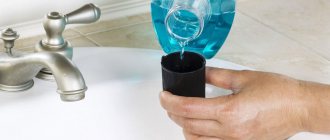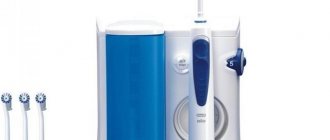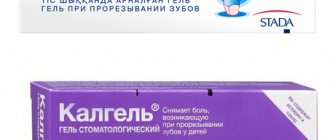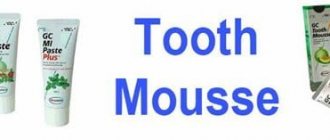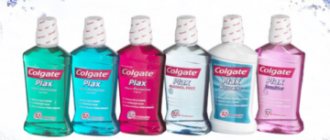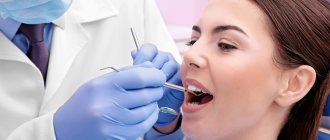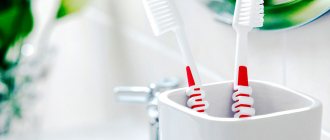Author of the article:
Soldatova Lyudmila Nikolaevna
Candidate of Medical Sciences, Professor of the Department of Clinical Dentistry of the St. Petersburg Medical and Social Institute, Chief Physician of the Alfa-Dent Dental Clinic, St. Petersburg
Oral hygiene is not only regular brushing of teeth in the morning and evening, but also the use of other means to remove bad breath and prevent dental diseases. One of these products is mouthwash. Previously, decoctions of medicinal plants were used in this capacity. Modern medicine offers complex, balanced compositions that have a targeted effect and provide the desired therapeutic or preventive effect.
Purpose of rinses for the mouth and gums
Dentists recommend using these products for:
- Keeping your breath fresh.
- For people who smoke, the components included in the product prevent yellowing of tooth enamel, and also reduce the destructive effect of nicotine and tar on tooth enamel.
- Reducing the effect of “staining” of the enamel as a result of frequent consumption of coffee, tea, wine and other drinks that affect the color of teeth.
- To reduce inflammation in the gums and reduce their bleeding.
- Reduced enamel sensitivity.
Also recommended for use:
- People who suffer from various oral diseases.
- Patients who have braces, dentures or any other structures in the oral cavity.
- After operations in the oral cavity (tooth extraction, installation of implants, etc.).
It must be taken into account that rinses are used as an aid to oral care. They should not be used as a substitute for brushing your teeth. The liquid product helps get rid of food particles and germs that cannot be removed during regular cleaning.
Recipes based on natural remedies
A decoction of oak bark will help get rid of bleeding gums and strengthen them. You can supplement the mixture with sage, chamomile or rose hips. If only oak bark is used, it is better to cook it in a water bath: a couple of tablespoons of crushed oak bark are placed in an enamel bowl and filled with water. The dishes are placed in a saucepan with water; it all needs to be heated for about half an hour.
When adding other herbs, a tablespoon of the mixture per one and a half glasses of water is enough. Bring to a boil and simmer a little under the lid, pour into a convenient container and cool. An important point: it is better to store the product no longer than a day, after which all the beneficial substances will evaporate.
For fresh breath, mouthwashes with mint are always useful. For half a liter of water you will need two tablespoons of dry green tea without additives and natural dried mint. Pour the herbs with clean hot water (500 ml),
leave to infuse overnight. In the morning, add a teaspoon each of benzoin tincture and myrrh infusion. Keep refrigerated.
An unusual recipe that will get rid of germs. It is only suitable for adults: add a tablespoon of thyme, myrrh and sage (dry herbs) to a cup of cognac and leave to steep for two weeks. The infusion is filtered and diluted with water (1:1) before rinsing. For a light whitening effect, you can add a spoonful of lemon juice.
Composition of funds
The composition may include the following main components:
- Substances aimed at eliminating the risk of inflammation (antiseptics). These include: triclosan, chlorhexidine
- Fluorine compounds (sodium fluoride, etc.)
- Extracts from plants (extracts)
- Xylitol
- Ethanol
The components contained in each product may differ depending on the purpose for which a particular mouthwash is made. Ethyl alcohol is practically not used in modern rinses, since it can dry out the oral cavity.
Classification
The classification divides mouth products into two main groups:
- hygienic (cosmetic) - in fact, only masking the problem;
- medicinal - really eliminating it.
Hygienic ones include deodorizing mouth rinses - refreshing, eliminating unpleasant odor, and whitening - brightening tooth enamel.
Therapeutic rinses can be divided into:
- anti-caries;
- painkillers (anti-inflammatory);
- antibacterial;
- against gingivitis and plaque;
- against tartar;
- astringents.
Anti-caries products usually contain a lot of fluoride, which strengthens teeth well. They are often prescribed to those who wear braces.
Pain-relieving mouth rinses are designed to relieve acute pain associated with certain oral diseases. You can buy mouthwashes with this effect in pharmacies.
Antibacterial rinses destroy harmful microorganisms and keep gums healthy; they usually have a complex synthetic composition.
Rinses that are designed to prevent gingivitis and plaque act on bacteria, slowing their growth in the mouth. If the product contains antiseptics, for example, triclosan, then it is used only with a prescription.
Anti-tartar products contain calcium citrate.
Astringents constrict blood vessels, thereby reducing their sensitivity, and form a film on nerve endings, protecting them from inflammation.
How to use it correctly?
Recommendations for using the product:
- The amount of product must correspond to the recommended amount. Information on the required dosage can be found in the package insert or on the cap of the rinse aid. Some manufacturers of products provide special dispensers that do not allow the use of liquid in excess of the norm.
- The product must be diluted if this is stated in the instructions.
- Mouthwash is usually used after daily brushing of teeth. More frequent use is possible only after consultation with your doctor.
- The rinsing time is from 20 seconds to a minute.
- The product should not be swallowed.
- It is not recommended to consume food or liquid for half an hour after the procedure.
- For young children, it is advisable to purchase products that are suitable for their age.
Nuances of selection and application
There are many formulations on the market that differ in color, taste, smell, shape, and type of packaging. They also differ in price, but this factor, according to Anna Derevyannykh, is not always indicative when choosing a product.
“Some formulations use expensive ingredients, while others use budget ones,” comments the specialist. “But the price is most influenced by marketing, packaging and advertising costs. In general, all rinses, regardless of price, are no different from each other.”
Therefore, when choosing a dental elixir, you should carefully read its composition and select a product depending on the condition of the oral cavity, existing problems or for their prevention. But you definitely shouldn’t pay attention to the color. According to the specialist, you can safely use red, blue, and green solutions every day. Even the brightest rinse does not stain either the enamel or gums. The only exceptions are patients who have undergone complex whitening. After whitening procedures, you should avoid using colored balms.
According to dentists, it is necessary to use mouthwash daily. Ideal - after each brushing of teeth with a brush and toothpaste. The solution should be taken into the mouth and vigorously move the cheeks for 30-60 seconds. During this time, the composition, moving under pressure, will have time to wash away impurities from the surface of the enamel, and the active components will begin to have a therapeutic effect on the oral cavity. Then you should spit out the liquid and do not eat or drink anything for half an hour. The longer the medicinal components remain in the mouth, in direct contact with the gum tissue and tooth enamel, the better the therapeutic effect they have.
pixabay.com/
Precautions for use
Before purchasing the product, you should consult with your doctor, since, in addition to the obvious benefits, there are several negative factors associated with its use:
- Change in taste sensations.
- Darkening or change in the natural color of tooth enamel as a result of prolonged use of mouthwash.
- If the product contains ethanol (ethyl alcohol), its use is hazardous to health (since there is a possibility of accidental ingestion of the liquid).
Do not forget about the individual intolerance of the body to some components. It is recommended to carefully study the composition before using the product so as not to cause harm to health. The most common side effects when using mouthwash:
- Burning in the mouth.
- Nausea.
- Diarrhea.
- Dry mouth.
- The appearance of seizures.
- Blueness of fingertips.
- The appearance of an inflammatory process in the lymph nodes.
- Dizziness.
- Blue lips.
- Excessive thirst.
- Impaired coordination of movements.
- Difficulty breathing, etc.
If at least one of the above symptoms appears, you should stop using the drug and consult your doctor. If the product is used as prescribed by a doctor, the risk of side effects is minimal.
Is mouthwash beneficial or harmful?
Few people pay attention to the composition of mouth rinses. But in vain. They may contain harmful substances that will damage both tooth enamel and gums. And this is already fraught with very expensive dental consequences.
Composition of mouth rinses
- One of these harmful substances is triclosan - it kills not only harmful but also beneficial bacteria. It has a direct effect on the muscles of the dental cavity, reducing their activity, which leads to such an unpleasant phenomenon as atrophy. With frequent use of triclosan, some pathogenic bacteria become resistant to its action, which reduces the benefit of its use to zero.
- Alcohol can irritate the mucous membranes and cause dry mouth.
- The next element is fluorine . Today it has become overused. Fluoride is added in huge doses to toothpastes and mouthwashes. And everything in life, including useful things, as we know, is good in moderation. Of course, fluoride is good for teeth, but only in small quantities. Unfortunately, the advertising industry is silent about this important fact. Excess fluoride destroys tooth enamel. And this leads to yellowing and darkening of the teeth and the occurrence of fluorosis - the enamel becomes fragile, the teeth become covered with red or brown spots, defects in the dental tissue appear and even the formation of holes.
- Calcium - in excessive quantities can cause nausea, vomiting, and constant thirst. Increased calcium intake is strictly not recommended for pregnant women, because... increases the risk of birth injuries and leads to placental calcenosis, which interferes with normal fetal nutrition.
- Neovitin is not recommended for pregnant and lactating women and people with carbohydrate metabolism disorders.
- Calcium quote - Allergic reactions sometimes occur: rash, itching, hives, stomach pain, nausea, flatulence, diarrhea or constipation.
- Chlorhexidine - with frequent use of chlorhexidine, brown or black spots appear on the teeth - the amount of plaque and tartar will increase. Dryness and burning in the mouth also occurs.
- Cetylpyridinium chloride is contraindicated during pregnancy and breastfeeding.
To use or not to use whitening and cosmetic rinses is up to you. It is important to remember that beneficial substances will not be able to penetrate behind the plaque film on their own, and therefore, without thorough hygiene, the use of any rinses is virtually useless. Therefore, they can only be used after thoroughly brushing your teeth with toothpaste.
Therapeutic rinses can help treat some gum inflammation if used strictly as recommended by your doctor. If you want to protect yourself from unpleasant consequences, ask your dentist to recommend an effective and safe product, do not use it too often and do not exceed the concentration specified in the instructions. If the medicinal rinse prescribed to you causes extremely discomfort, it is better to tell your doctor.
Number of views 2,445
Mouthwash: is it necessary and who should use it?
Today, rinsing liquids are not very popular. However, the question of whether modern man needs them should be answered in the affirmative. After all, it is very important to maintain a healthy oral cavity, preventing the proliferation of pathogenic bacteria.
In case of weak gums, their tendency to bleeding and inflammation, chronic diseases and when recovering from surgery, the use of gum rinses is simply necessary. Such products contain substances to relieve inflammation and quickly heal gum tissue, strengthen and reduce bleeding.
If you have very sensitive teeth, it is also worth using a mouthwash regularly. There are products specifically designed for teeth that react painfully to hot and cold foods and drinks. They not only strengthen tooth enamel, but also create a protective film that lowers the sensitivity threshold and also protects teeth from cervical caries.
Using mouthwash during pregnancy will help many expectant mothers keep their teeth intact and healthy. Indeed, during this period, bleeding gums, increased sensitivity of teeth, and damage due to a lack of vitamins and minerals may appear. Therefore, it is especially important to monitor oral hygiene. Special compounds create a protective film, preventing the destruction of tooth enamel.
Rinse aids "ASEPTA"
Typically, manufacturers of rinses produce them in specialized series, each product is “responsible” for the treatment (prevention) of a specific disease (or diseases that are closely related to each other). For example, Asepta Fresh mouthwash helps get rid of unpleasant odors thanks to the antibacterial effect of plant extracts and mint with lime. You can buy mouthwash in regular pharmacies and stores, large supermarkets, online pharmacies and online stores.
Asepta Fresh mouthwash is made from natural plant ingredients:
- Lime and mint provide pleasant flavor profiles.
- Potassium and sodium remove plaque and tartar.
- Extracts of witch hazel, sage and chamomile provide antimicrobial and anti-inflammatory effects.
- Xylitol protects tooth enamel.
- Potassium citrate reduces the sensitivity of enamel.
Characteristics of Asept Fresh and its effects:
- Protects teeth and gums from plaque.
- Has a calming effect.
- Prevents the occurrence and development of carious formations in the oral cavity.
- Preserves the natural whiteness of tooth enamel.
- Provides fresh breath for a long period.
- Prevents gum inflammation and reduces bleeding.
- The product does not contain components such as alcohol and dyes.
- It can be used for an unlimited amount of time.
- Has no contraindications.
Taking into account the peculiarities of the action of various rinses, dentists recommend using not one, but several products - either alternating them or using them in combination. Since these products play a supporting role, they are usually matched with appropriate toothpastes. Complex influence is much more effective.
Regular use of properly selected rinses is not only an attractive appearance of the oral cavity, but also the health of teeth and gums.
Essential oils
A recipe based on a weak chamomile decoction will help soothe gums and relieve bleeding: half a liter of decoction, a tablespoon of natural liquid honey and ten drops of several types of essential oils: orange, mint, pine, eucalyptus, cloves, sage. The oils are first added to the honey, everything is mixed well and dissolved in water. Another advantage of the composition is that it has a good whitening effect, and the enamel is not damaged.
Propolis and calamus will help quickly relieve any inflammation: a teaspoon of propolis and calamus tinctures, five drops of tea tree oil and one hundred ml of water. The solution must be stored in the refrigerator in a tightly sealed container.
Clinical researches
ASEPTA rinses are clinically proven effective. For example, repeated clinical studies have proven that the two-component oral product ASEPTA ACTIVE more effectively combats the causes of inflammation and bleeding compared to single-component rinses - it reduces inflammation by 41% and reduces bleeding gums by 43%.
Sources:
- The role of anti-inflammatory rinse in the treatment of periodontal diseases (L.Yu. Orekhova, A.A. Leontyev, S.B. Ulitovsky) L.Yu. OREKHOVA, Doctor of Medical Sciences, Prof., Head of Department; A.A. LEONTIEV, dentist; S.B. ULITOVSKY, Doctor of Medical Sciences, Prof. Department of Therapeutic Dentistry of St. Petersburg State Medical University named after. acad. I. P. Pavlova
- Report on determining/confirming the preventive properties of commercially produced personal oral hygiene products: Asepta toothpaste used in combination with Asepta mouthwash and Asepta gum balm Head. Department of PFS Doctor of Medical Sciences Professor S.B. Ulitovsky St. Petersburg State Medical University named after Academician I.P. Pavlova. Faculty of Dentistry. Department of Preventive Dentistry.

